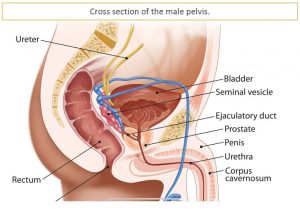What is the prostate? Mr Ben Eddy, Consultant Urological Surgeon at One Ashford Hospital discusses the prostate, its function, and signs and symptoms that should be investigated further.
The prostate is a small organ weighing around 18g and measuring 3 x 4 cm situated deep in the male pelvis. It is typically described as the size of a walnut and is only found in men. The prostate is an organ of fertility and in conjunction with the seminal vesicles which lie behind the gland produces the majority of the fluid for the ejaculate.

The prostate sits below the urinary bladder which stores urine. The prostate lobes form the first part of the “Urethra” or urinary tube which when a man wants to pass water, the urine travels through the prostate and down and out through the penis. The main valve or sphincter that stops the man from being incontinent (leaking urine) sits just below the prostate; this valve is all part of the pelvic floor muscles. Because of the close proximity of the prostate gland to the pelvic floor it also has a role in urinary continence. There is also a valve above the prostate in close relation to the bladder known as the bladder neck; this valve closes during ejaculation so the ejaculate doesn’t go up into the bladder but comes out in the normal way.
The prostate sits just in front of the rectum and this is why the back of the prostate can be felt during a rectal examination. This examination is a very quick and painless examination that can detect problems at the back of the gland. In some men this examination can pick up diseases such as prostate cancer early so is an important part of an initial prostate assessment.
As men get older the prostate slowly grows over many years, this is a natural process related to the effects of testosterone, the male hormone, on the prostate gland and occurs in almost all men. When the prostate grows, it can narrow the urethra or urinary tube that goes through the prostate and put a back pressure on the bladder. This consequently can lead to prostate symptoms referred to as Lower Urinary Tract Symptoms or LUTS for short. Symptoms such as slowing of the urinary flow, a pause before voiding, a feeling of not emptying the bladder properly, peeing little and often or having to rush to the toilet are not uncommon. One of the most problematic symptoms is getting up at night to pass urine. All these symptoms can be helped by your GP or Urologist. The prostate can also get infected known as prostatitis and of course as men get older the prostate can also grow malignant cells or prostate cancer.
If you are experiencing any abnormal symptoms and would like to book a consultation with Mr Ben Eddy, you can contact the hospital direct on 01233 423000 or contact us here.

 One Ashford
One Ashford One Hatfield
One Hatfield